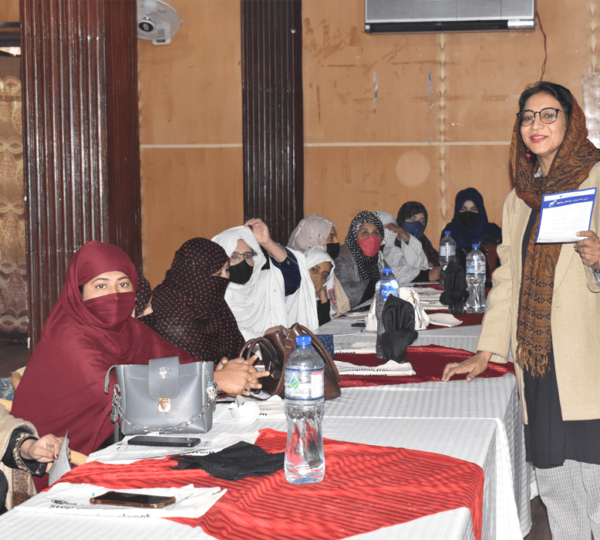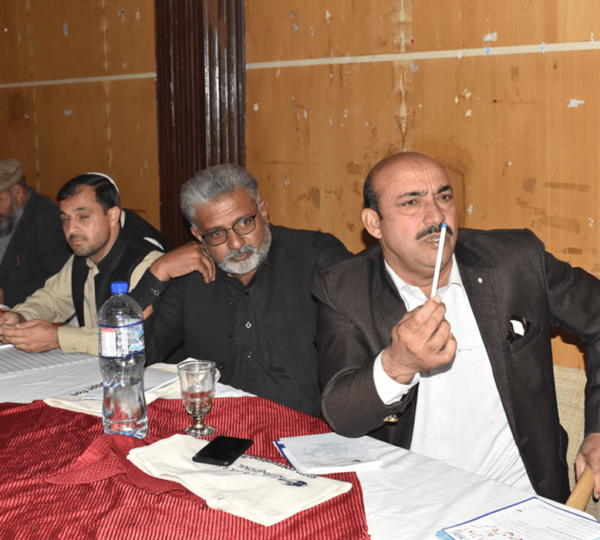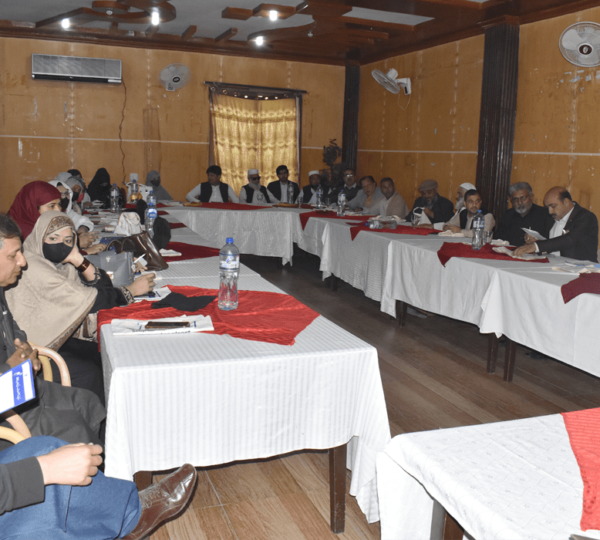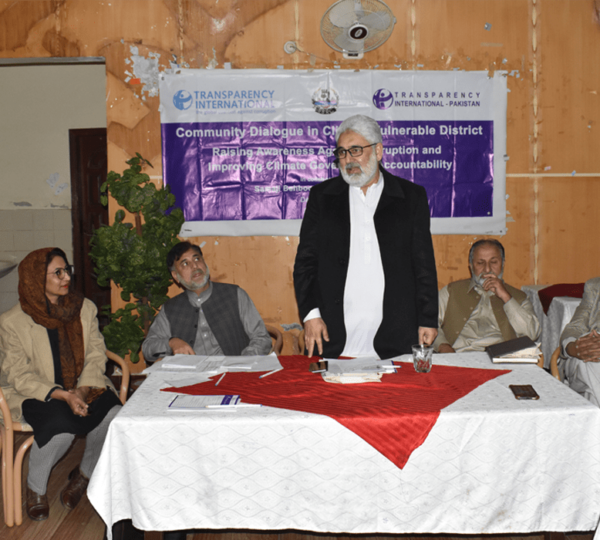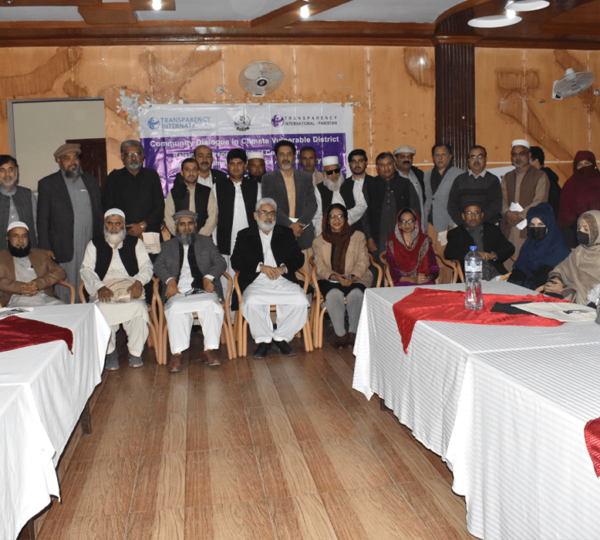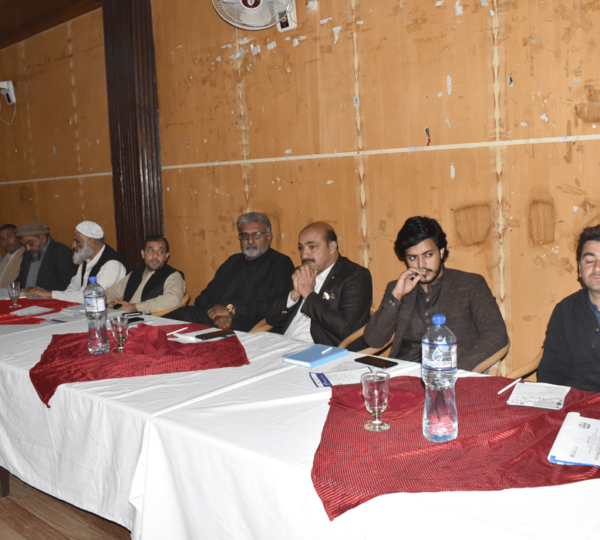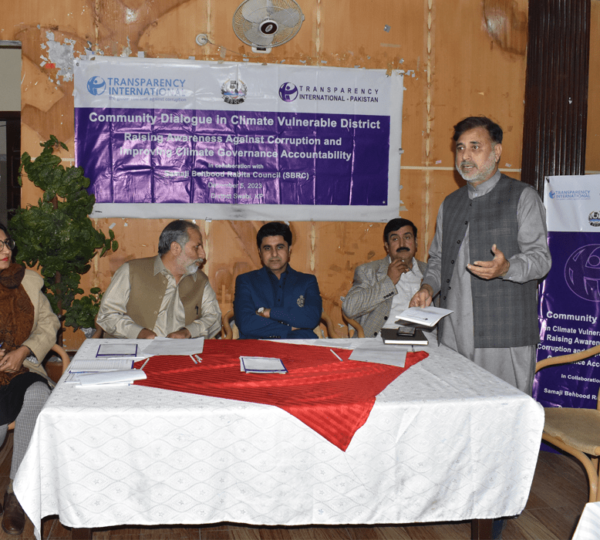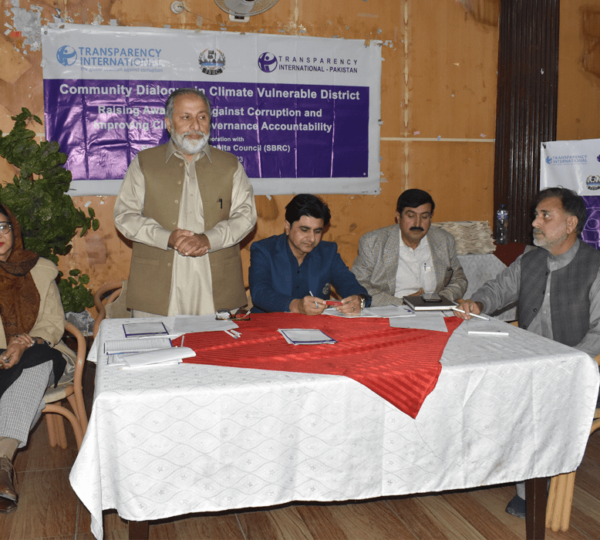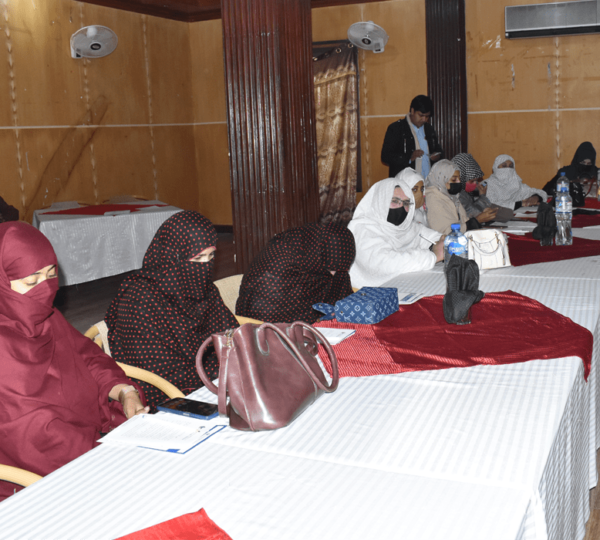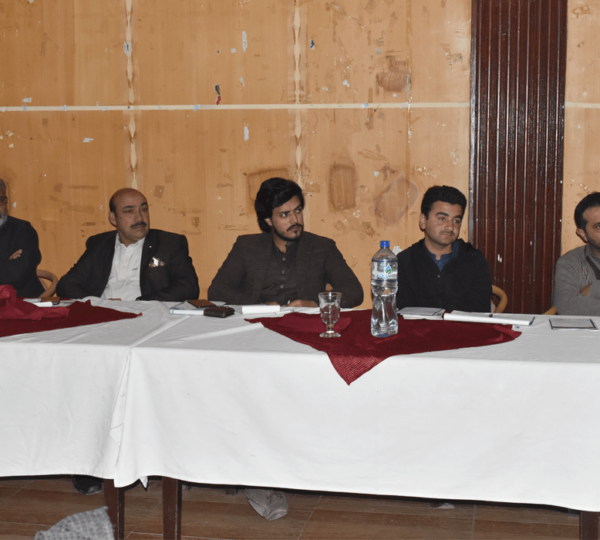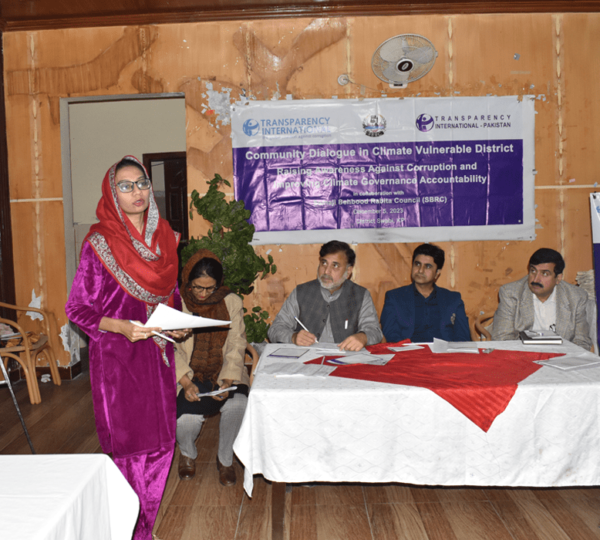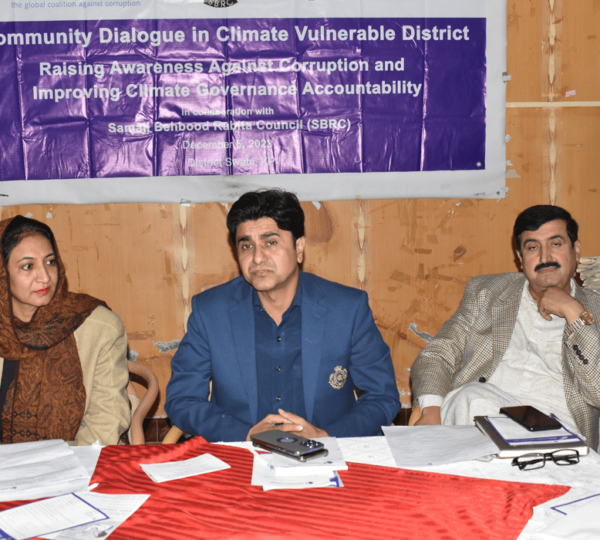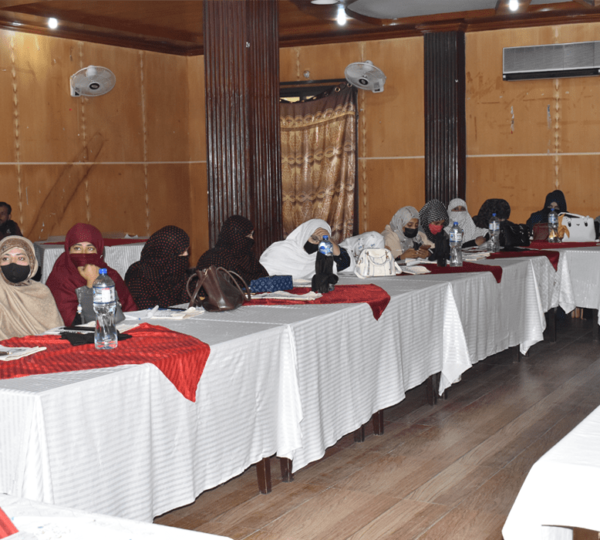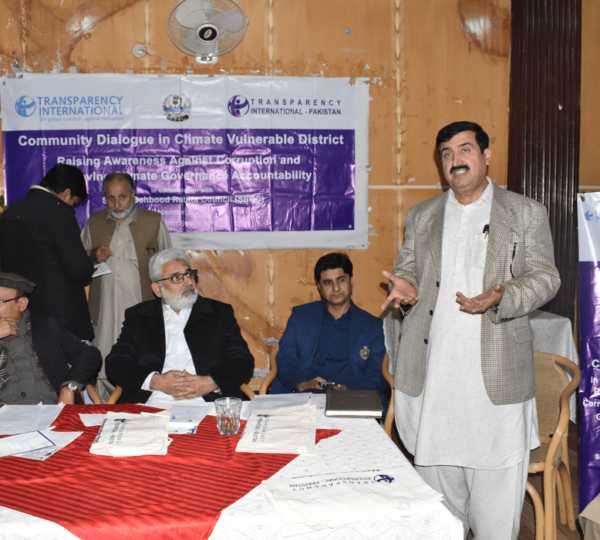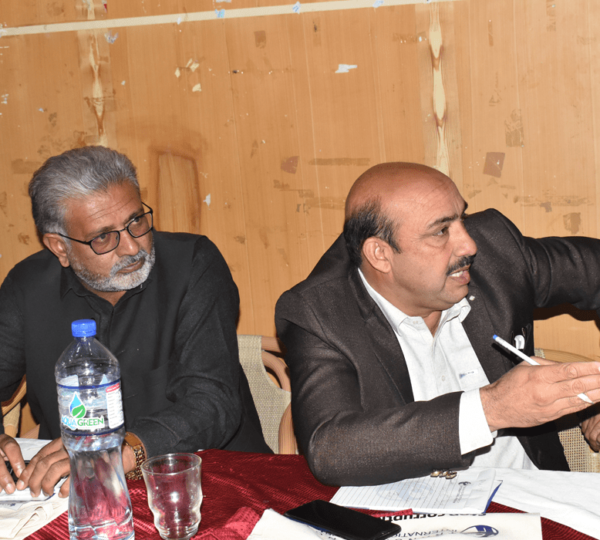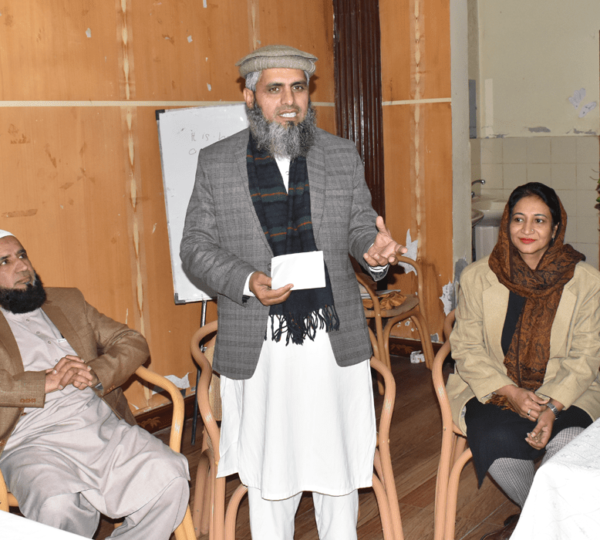- Home
- Community Dialogue in Climate Vulnerable District: Raising Awareness against Corruption and Improving Climate Governance Accountability District Swabi
Community Dialogue in Climate Vulnerable District: Raising Awareness against Corruption and Improving Climate Governance Accountability District Swabi
Community Dialogue in Climate Vulnerable District: Raising Awareness against Corruption and Improving Climate Governance Accountability
Venue: District Swabi, Khyber Pakhtunkhwa
Date: Tuesday, 05 December 2023
Transparency International Pakistan organized a Community Dialogue in the climate-vulnerable district of Swabi, Khyber Pakhtunkhwa on Tuesday, December 5th, 2023. The purpose of the dialogue was to raise awareness against environmental corruption among marginalized communities, fostering citizen participation in climate decision-making and planning.
Around 50 diverse group of people from civil society, communities and minority groups, from climate vulnerable tehsils along with district administration including Additional District Commitioner Relief and Human Rights District Swabi, Divisional Director, Environmental Protection Agency (EPA), representative of District Education Offices, District Social Welfare Officer Swabi, Print and electronic media, lady health workers, female teachers, child and women protection officers and representatives of Jirga participated in climate community dialogues.
The dialogue formally started with the recitation of the Holy Quran. After which a round of introduction was carried out. Mr. Ruhal Amin, CEO of Samaji Behbood Rabita Council (SBRC) who welcomed the participants.
Ms. Nasreen Memon, Project Coordinator gave an overview of TI Pakistan and the project “Strengthening Integrity and Inclusiveness in Climate Governance in Pakistan” and emphasized that the program aims to empower communities, with tools for social accountability, enabling them to monitor environmental issues and actively contribute to climate planning. She highlighted that the community climate dialogues seek to enhance communities understanding of provincial climate policies while showcasing ways in which women, youth, and marginalized communities can actively contribute to climate planning.
Ms. Fariha Fatima, Assistant Project Coordinator TI Pakistan discussed KP’s Climate Policy & Community Participation. She discussed in detail how KP’s climate policy ensures community participation in climate decision making and identified gaps which need improvement. She emphasized that the commitment of the KP Climate Change Policy 2022 lies in the implementation of initiatives that are sensitive to gender concerns. These initiatives aim to actively involve women in community organizations, improve their access to crucial resources, empower them to participate in decision-making processes, and equip them with comprehensive information about climate change and adaptive strategies.
She also shared that the Policy provides a District wise Climate Hazards Vulnerability map which serves as a valuable tool by identifying specific climate risks and vulnerabilities in different districts. It enables targeted and effective resource allocation for disaster preparedness and response efforts, helping communities and authorities prioritize areas at higher risk.
Afterwards, Mr. Muhammad Ali, ADC Relief and Human Rights spoke on Swabi’s climate vulnerability. He said that Swabi is experiencing an increase in hailstorms and temperature which is effecting the district’s agriculture. He expressed his concern that district has become climate vulnerable and facing floods almost every year which cause heavy loss of lives and economy.
He also spoke on Citizen’s Right to Information and said every citizen has the right to acquire the information and people in Khyber Pakhtunkhwa use this act regularly. He shared that during the floods 2022 Divisional and District management responded proactively on the RTI applications. People wanted to know the status of relief work and goods during floods, which the district administration responded proactively.
Ms. Nasreen Memon, Project Coordinator, presented Social Accountability Tools, emphasizing citizens role in public participation and transparency. Tools like public budgeting and social audits empower communities for just and transparent climate response.
Afterwards, Ms. Nasreen Memon, Project Coordinator, TI Pakistan gave a presentation on Social Accountability Tools for Public Participation and Monitoring for Just and Transparent Climate Action. She highlighted that tools such as public budgeting, public consultations, social audits, community-led monitoring and finance dashboards on websites of climate related departments play a crucial role in fostering public participation and ensuring transparency in climate response efforts. These tools empower communities to actively engage in monitoring environmental initiatives, providing a mechanism for holding stakeholders accountable. She said that by enhancing public awareness and involvement, these tools contribute to a more inclusive and informed approach to addressing climate challenges.
Mr. Fareedullah Shah, Divisional Director, Environment Protection Agency (EPA) discussed institutional responses and awareness campaigns in the most affected districts of Khyber Pakhtunkwha. Mr. Hafiz Abdi, District Education Officer, Swabi shared the use of schools as relief camps, stressing the need for establishing relief sites during disasters so education is not affected.
Mr. Syed Fareedullah Shah, Divisional Director, Environmental Protection Agency (EPA) discussed institutional response during emergencies and mechanisms for public participation. He said that 7 districts of Khyber Pakhtunkhwa have been declared as the most affected districts during the floods 2022 and the Provincial government has prepared a specific disaster preparedness plan for the vulnerable districts. He encouraged the participants to join hands with district administration in creating awareness about climate change, climate vulnerability and disaster risk reduction so communities are more aware about how to adapt to climate change.
Mr. Hafiz Abdi, District Education Officer, and Mr. Zafar Khan, District Social Welfare Officer Swabi emphasized that the schools are converted to relief camps during disasters, there is a need to have in place evacuation and resettlement plans so education is not affected. He also shared that during 2022 floods, education department made sure to continue to provide necessary education to the children who were staying in schools. Mr. Zafar Khan, District Social Welfare Officer, briefed the participants about relief efforts carried out in collaboration with civil society organizations.
Participants then engaged in a discussion, highlighting issues like aid distribution transparency and poor infrastructure.
During the post-2022 floods discussion, Afzal Khan raised concerns about uneven relief money distribution, noting instances of double payments to some and none to the neediest. Stressing transparency and accountability, he called for a fair system to aid climate affectees.
Ms. Shabana highlighted challenges around Women University, citing a deficient sewerage system and broken roads hindering student access. Mr. Muhammad Ali, ADC Relief, assured action on the infrastructure issues.
Mr. Muhammad Ali, ADC Relief, responded to participants, stating that they have received lists of affected people from the tehsil, and cheques were distributed accordingly. Furthermore, he mentioned that during the flood emergency, it was challenging to monitor where corruption might occur. He emphasized that it is the responsibility of both the administration and the community to ensure accountability. He also encouraged all participants to use the Right To Information Act to highlight their concerns so that these reach the authorities.
Afterwards, Ms. Nasreen Memon highlighted the significance of TI Pakistan’s Legal Advice Centre and The Khyber Pakhtunkhwa Right to Information Act, 2013. She stressed the importance of community involvement, urging active participation in reporting corruption and utilizing the RTI Act for accessing climate-related information.
Emphasizing The Khyber Pakhtunkhwa Right to Information Act, 2013, as a crucial social accountability tool for climate planning, Ms. Memon encouraged partner organizations and relevant departments to address the urgent need for more awareness at the grassroots level. The focus should be on climate change mitigation, adaptation, resilience, and providing tools for social accountability.
Towards the end, Mr. Ruhal Amin, CEO of Samaji Behbood Rabita Council (SBRC) concluded the dialogue by expressing gratitude to TI Pakistan, the district administration, and participants from diverse communities for their active involvement and participation.


